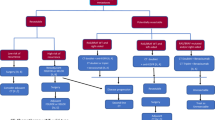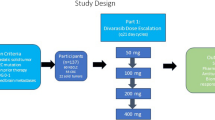Abstract
In the treatment of metastatic colorectal cancer, chemotherapy is used as a backbone to which an angiogenesis inhibitor such as bevacizumab (vascular endothelial growth factor [VEGF]) or a monoclonal antibody to the epidermal growth factor receptor (EGFR) such as cetuximab or panitumumab is added. In this article, we seek answers to the question: “FIRE-3 and C80405: is there a best choice for initial treatment of metastatic colorectal cancer?” In the absence of clear and univocal evidence that EGFR inhibitors should be used in the first-line setting for patients with metastatic RAS wild-type colorectal cancer, the physician and patient still have the choice between bevacizumab or an EGFR inhibitor as addition to the chemotherapy (FOLFIRI or FOLFOX) in this setting. This choice will be influenced by the different toxicity profiles of bevacizumab and cetuximab or panitumumab and will therefore depend on existing comorbidities of the patient and patient/physician preferences. The higher response rate of the combination of chemotherapy with cetuximab could make this treatment more interesting as induction therapy.
Similar content being viewed by others
References
Papers of particular interest, published recently, have been highlighted as: • Of importance •• Of major importance
Ferlay J, Soerjomataram I, Dikshit R, et al. Cancer incidence and mortality worldwide: sources, methods and major patterns in GLOBOCAN 2012. Int J Cancer. 2015;136(5):E359–86.
Cancer Genome Atlas Network. Comprehensive molecular characterization of human colon and rectal cancer. Nature. 2012;487:330–7.
Heinemann V, von Weikersthal LF, Decker T, et al. FOLFIRI plus cetuximab versus FOLFIRI plus bevacizumab as first-line treatment for patients with metastatic colorectal cancer (FIRE-3): a randomised, open-label, phase 3 trial. Lancet Oncol. 2014;15(10):1065–75. In this phase 3 trial the authors demonstrate a statistically significant overall survival advantage in favour of chemotherapy + cetuximab.
Venook AP, Donna N, Heinz-Josef L, et al. CALGB/SWOG 80405: phase III trial of irinotecan/5-FU/leucovorin (FOLFIRI) or oxaliplatin/5-FU/leucovorin (mFOLFOX6) with bevacizumab (BV) or cetuximab (CET) for patients (pts) with KRAS wild-type (wt) untreated metastatic adenocarcinoma of the colon or rectum (MCRC). Abstract Number: LBA3. J Clin Oncol. 2014;32:5s. In this phase 3 trial the authors demonstrate that either chemotherapy + bevacizumab or chemotherapy + cetuximab is appropriate in first line.
Lenz H, Niedzwiecki D, Innocenti F, et al. CALGB/SWOG 80405: phase III trial of irinotecan/5-FU/leucovorin (FOLFIRI) or oxaliplatin/5-FU/leucovorin (mFOLFOX6) with bevacizumab (BV) or cetuximab (CET) for patients (pts) with expanded ras analyses untreated metastatic adenocarcinoma of the colon or rectum (mCRC). Ann Oncol. 2014;25:1–41.
Stintzing S, Modest DP, von Fischer Weikersthal L, et al. Independent radiological evaluation of objective response, early tumor shrinkage, and depth of response in FIRE-3 (AIO KRK-0306) in the final RAS evaluable population. Ann Oncol. 2014;25:1–41.
Fakih MG. Metastatic colorectal cancer: current state and future directions. J Clin Oncol. 2015.
Schwartzberg LS, Rivera F, Karthaus M, et al. PEAK: a randomized, multicenter phase II study of panitumumab plus modified fluorouracil, leucovorin, and oxaliplatin (mFOLFOX6) or bevacizumab plus mFOLFOX6 in patients with previously untreated, unresectable, wild-type KRAS exon 2 metastatic colorectal cancer. J Clin Oncol. 2014;32(21):2240–7. This randomized phase II study was the first to show a survival advantage in the treatment arm with chemotherapy + panitumumab, in comparison with chemotherapy + bevacizumab.
Douillard JY, Oliner KS, Siena S, et al. Panitumumab-FOLFOX4 treatment and RAS mutations in colorectal cancer. N Engl J Med. 2013;369(11):1023–34.
Loupakis F, Cremolini C, Salvatore L, et al. FOLFOXIRI plus bevacizumab as first-line treatment in BRAF mutant metastatic colorectal cancer. Eur J Cancer. 2014;50(1):57–63.
Compliance with Ethics Guidelines
Conflict of Interest
Jan Van den Brande, Kostas Papadimitriou, Marika Rasschaert and Marc Peeters declare that they have no conflict of interest.
Human and Animal Rights and Informed Consent
This article does not contain any studies with human or animal subjects performed by any of the authors.
Author information
Authors and Affiliations
Corresponding author
Additional information
This article is part of the Topical Collection on Adjuvant Therapy for Colon Cancers
Rights and permissions
About this article
Cite this article
Van den Brande, J., Papadimitriou, K., Rasschaert, M. et al. FIRE-3 and C80405: Is There a Best Choice for Initial Treatment of Metastatic Colorectal Cancer?. Curr Colorectal Cancer Rep 11, 298–302 (2015). https://doi.org/10.1007/s11888-015-0286-1
Published:
Issue Date:
DOI: https://doi.org/10.1007/s11888-015-0286-1




